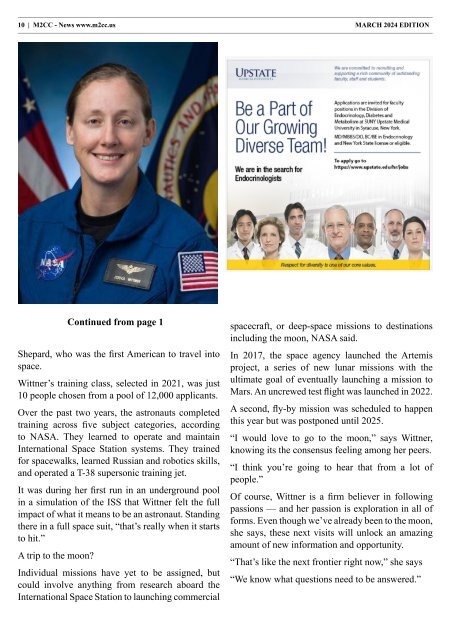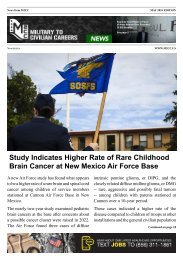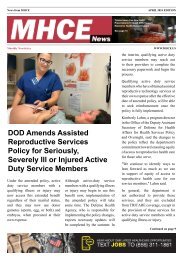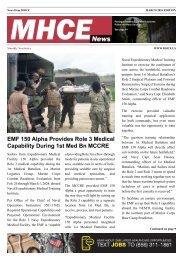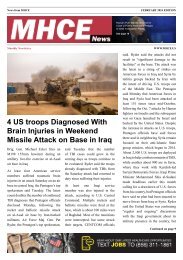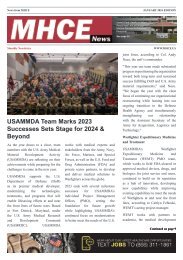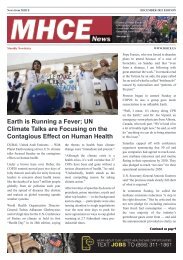M2CC MARCH 2024
Create successful ePaper yourself
Turn your PDF publications into a flip-book with our unique Google optimized e-Paper software.
10 | <strong>M2CC</strong> - News www.m2cc.us <strong>MARCH</strong> <strong>2024</strong> EDITION WWW.<strong>M2CC</strong>.US<br />
Newsletter | 11<br />
Why Are Clocks<br />
Set Forward in the<br />
Spring? Thank<br />
Wars, Confusion<br />
and a Hunger for<br />
Sunlight!<br />
Once again, most Americans will set their clocks forward<br />
How we came to move the clock forward in the<br />
by one hour this weekend, losing perhaps a bit of sleep<br />
spring, and then push it back in the fall, is a tale that<br />
but gaining more glorious sunlight in the evenings as the<br />
spans over more than a century — one that’s driven<br />
days warm into summer. . There’s been plenty of debate<br />
by two world wars, mass confusion at times and a<br />
over the practice but about 70 countries currently use<br />
human desire to bask in the sun for a long as possible.<br />
Shepard, who was the first American to travel into<br />
space.<br />
Wittner’s training class, selected in 2021, was just<br />
10 people chosen from a pool of 12,000 applicants.<br />
Over the past two years, the astronauts completed<br />
training across five subject categories, according<br />
to NASA. They learned to operate and maintain<br />
International Space Station systems. They trained<br />
for spacewalks, learned Russian and robotics skills,<br />
and operated a T-38 supersonic training jet.<br />
It was during her first run in an underground pool<br />
in a simulation of the ISS that Wittner felt the full<br />
impact of what it means to be an astronaut. Standing<br />
there in a full space suit, “that’s really when it starts<br />
to hit.”<br />
A trip to the moon?<br />
Continued from page 1<br />
Individual missions have yet to be assigned, but<br />
could involve anything from research aboard the<br />
International Space Station to launching commercial<br />
spacecraft, or deep-space missions to destinations<br />
including the moon, NASA said.<br />
In 2017, the space agency launched the Artemis<br />
project, a series of new lunar missions with the<br />
ultimate goal of eventually launching a mission to<br />
Mars. An uncrewed test flight was launched in 2022.<br />
A second, fly-by mission was scheduled to happen<br />
this year but was postponed until 2025.<br />
“I would love to go to the moon,” says Wittner,<br />
knowing its the consensus feeling among her peers.<br />
“I think you’re going to hear that from a lot of<br />
people.”<br />
Of course, Wittner is a firm believer in following<br />
passions — and her passion is exploration in all of<br />
forms. Even though we’ve already been to the moon,<br />
she says, these next visits will unlock an amazing<br />
amount of new information and opportunity.<br />
“That’s like the next frontier right now,” she says<br />
“We know what questions need to be answered.”<br />
what Americans call daylight saving time.<br />
DALLAS — Once again, most Americans will set their<br />
clocks forward by one hour this weekend, losing perhaps<br />
a bit of sleep but gaining more glorious sunlight in the<br />
evenings as the days warm into summer.<br />
Where did this all come from, though?<br />
There’s been plenty of debate over the practice, but<br />
about 70 countries — about 40% of those across the<br />
globe — currently use what Americans call daylight<br />
saving time.<br />
While springing the clocks forward “kind of jolts<br />
our system,” the extra daylight gets people outdoors,<br />
exercising and having fun, says Anne Buckle,<br />
web editor at timeanddate.com, which features<br />
information on time, time zones and astronomy.<br />
“The really, really awesome advantage is the bright<br />
evenings, right?” she says. “It is actually having<br />
hours of daylight after you come home from work to<br />
spend time with your family or activities. And that is<br />
wonderful.”<br />
Here are some things to know so you’ll be conversant<br />
about the practice of humans changing time:<br />
In the 1890s, George Vernon Hudson, an astronomer<br />
and entomologist in New Zealand, proposed a time<br />
shift in the spring and fall to increase the daylight.


